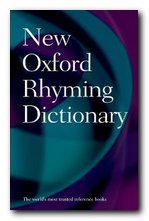grouped lists of rhyming words – plus cross references
As John Lennard says in his introduction to this godsend compendium for rhymers and poets: “Rhyme is everywhere – because it works. In advertising jingles, football chants, birthday card greetings, tabloid headlines, political slogans, and catchphrases, rhyme makes the sentiments more powerful and more memorable”. You can use the New Oxford Rhyming Dictionary to look up rhymes for specific words; browse sets of words for inspiration; use the tips in marginal notes to create extra sets of rhymes; or learn from examples given throughout the book how other writers past and present have used rhyme. The book is structured in quite an interesting way. First Lennard’s introduction explains the nature of rhyme and its prevalence in poetry and everyday life. He gives a very wide-ranging account of how poets have worked – from the early Renaissance to the present day.
 The second part of the book is the heart of the matter – words grouped into sets according to their vowel sound. These are actually listed in the order of word endings – as in -ar, -ee, and -ng. So the listings for -ar run aargh, Accra, afar, aide mémoire and so on. This might sound complicated, but becomes clearer with use, as in the example which follows here.
The second part of the book is the heart of the matter – words grouped into sets according to their vowel sound. These are actually listed in the order of word endings – as in -ar, -ee, and -ng. So the listings for -ar run aargh, Accra, afar, aide mémoire and so on. This might sound complicated, but becomes clearer with use, as in the example which follows here.
The third part is an index which runs from Aachen (rhyme words darken and Petrachan) to zymurgy. Can you imagine trying to find a word that would rhyme with zymurgy? I realise you’ve probably never heard of the word – and neither had I. (It means ‘The branch of chemistry that deals with fermentation processes, as in brewing….’) But that’s how thorough the listings are.
What you are likely to do is look up a term in the 4500 word index. There you will be directed to the rhyming terms listed in part two. These are arranged in order of correspondence, where the first word is a perfect rhyme, and subsequent entries less so. For instance if you look up the word lover in the index you are referred to section 12,87 where you find the following options:
- disapprover, hoover, improver, louvre (US louver), manoeuvre (US maneuver), mover, outmanoeuvre (US outmaneuver), reprover, Suva, Tuva, Vancouver
- cover, Glover, hardcover, lover, plover, undercover
- vulva, triumvir, slipcover, Cordova, baklava, helluva, Ulanova, Genova, Vaishnava, Ostrava, Vltava
- fervour (US fervor), Minerva, Nerva, observer, server, swerver
- time-server
The choice amongst these terms leads to interesting issues of pronunciation and the politics of accent and language use – which Lennard touches on in his introduction. The examples of good rhyme he gives throughout the book are an interesting and very unstuffy selection which includes classics, modern poetry, and even song lyrics.
The new second edition of this work has added fifty extra pages of recently coined words – such as Americano, iPod, sub-prime,, and vuvuzela. These are drawn from the huge databases held by Oxford Dictionaries as part of the corpus on which their linguistic research is based.
© Roy Johnson 2010
John Lennard (ed), New Oxford Rhyming Dictionary, Oxford: Oxford University Press, second edition, 2012, pp.448, ISBN: 0199652465
More on dictionaries
More on language
More on literary studies
More on writing skills